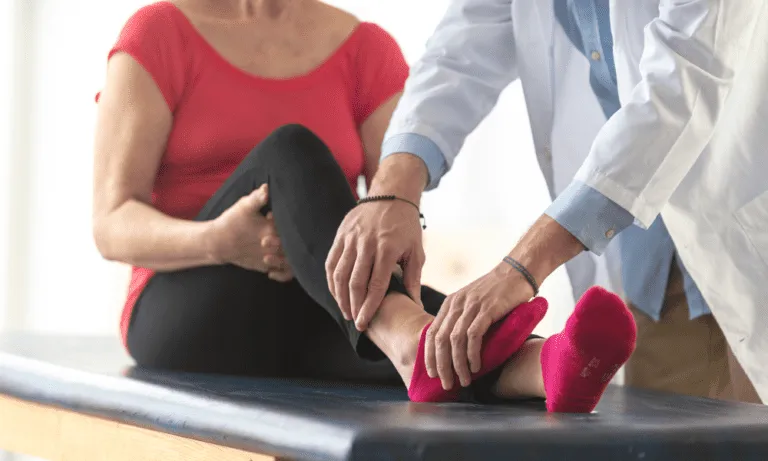When we hurt ourselves, we have a tendency to just “rest” and think that not moving, will help our pain go away. Alternatively, we have to MOVE in order to help mitigate the pain and prevent ourselves from stiffening. This is a common misconception among our population, and our team at Universus Physical Therapy & Wellness is here to help you learn how to deal with pain and provide insight on this debated topic. Everyday things we hear our patients say are:
- “I can’t squat down because of my L4-L5 herniated disc”
- “I don’t exercise anymore because of my sciatica”
- “I used to be able to lift a lot but then I threw my back out” “I can’t walk as much anymore because my legs hurt”
- “I have to be mindful of my posture because if I slack off, my body falls apart” “I can’t lift because of my butt wink and I can’t keep a flat back”
- “We can only bend our joints so many times before they fail”
The list goes on and on.
What is the Best Way to Manage Pain?
These are all things that we as physical therapists hear each and every single day. In fact, a massive part of our jobs revolves around education and grading our interventions in order to improve your ability to do the things you love and live healthier and pain-free lives.

The idea that pain is a signal from our bodies that something is wrong is a reasonable concept. If something hurts, why should you even bother doing it? To an extent this is true, and if something is causing you pain, you can definitely see that as a sign that maybe modifications are needed. However, we definitely should not take this as a sign that what we are doing is detrimental to our bodies!
What is Pain and How Do We Combat It?
Pain is such a complex experience, with so many factors influencing that one experience. You are a human being, not a robot. You cannot be expected to do everything perfectly 100% of the time. In fact, I would argue that in most regards, this perfect doesn’t even exist. Take this as an example:
Research (Arjmand et al, 2005) shows that you can’t truly “keep a flat back” as you squat and hip hinge to reach toward the ground. No matter how hard we try, we have a degree of spinal flexion (sometimes near maximum) as we move downwards. Yet, we follow cadaver studies that say that spine flexion can lead to detrimental effects on our discs.
So should we NEVER squat and reach towards the ground? NO!
Instead, we should practice and look for ways to maximize our abilities to squat and reach toward the ground safely and efficiently so that we can feel safe and powerful every time we do.

Understanding Our Bodies Capabilities
As I’ve said before, we are not robots. There is no finite number of times we can bend a body part and no finite number of pressure that we can load onto our joints before they combust and break. There are few limits that our bodies cannot adapt and heal from- we break bones and herniate discs only for them to heal and we ultimately return to our daily lives with little thought of the trauma we’ve faced.
Our bodies have the amazing capability of adapting to loads placed against them to become stronger, not weaker. Next time you think about the idea of “bone on bone” or “severe MRI results”, think about how much your body has gone through to get to this point, and how much the body has transformed as a result to help you continue to live your life. Now apply that same thinking to the future- your body will continue to transform and adapt as you continue to move.
With all of this being said, how do we reconcile that despite the fact that our bodies are resilient and adaptable to load, we still feel pain? Another question I would ask is how strong is the correlation between chronic pain and injury.
How Does Pain Work?
Pain is such a complex and dynamic experience that can be attributed to a seemingly innumerable number of factors including social, psychological, and mechanical reasons. Mechanically, there can be an injury to a body part- and pain signals get sent via our sensory nerves that our brain interprets as pain. However, did you know that our past experiences can guide our perception of pain? Research (Linton et al. 2011) has shown that our emotional state and experiences can influence how we perceive pain. “I have a high pain tolerance” or the opposite “I have such a low pain tolerance” are examples of this. Why do some people with an injury like- a herniated disc- experience intense levels of pain while others don’t?
The answer isn’t completely clear- but what is clear is that there are other factors influencing someone’s ability to feel more or less pain than others with the same exact injuries. Understanding this is advantageous because it opens us up to so many different approaches to treating our pain. We can look beyond the site of injury, and tackle other factors that significantly impact your pain such as the psychological, diet, and social aspects. Just by engaging these different facets, we can influence your pain tolerance immensely!

How Can I Deal With My Pain?
So what does this all mean?
- Pain is an amazingly complex experience that has many factors that influence it. Having an injury does not mean you will have pain. Having an injury at a site of pain does not mean that the injury is the only factor influencing that pain.
- There are many injuries that you may not exactly heal from. As we age, arthritis develops and some tissues lack blood supply and will not heal. However, this does not mean that you are stuck with this pain forever! Physical therapy has a great track record for helping you manage your symptoms and ultimately move beyond your pain despite the seemingly negative physical changes that your body has gone through.
- Your body has the amazing ability to adapt to stresses and loads that you place on your body. It’s been adapting your entire life and will continue to do so as long as you continue to put stress on it. This can be a negative thing- too little activity or overloading the body constantly may lead to harmful effects on the body. However, on the flip side, this can totally be a positive thing- where placing controlled stress in potentially compromising positions leads to positive growth, improvements in strength, range of motion, and ultimately decreased pain!
- Don’t be afraid to move! Don’t let fear dictate how you do things and how you function in your day-to-day lives. Of course, there are safer ways to do things, and we don’t want to rush into things without proper preparation- but the body is capable of amazing things you have proven to yourself repeatedly throughout your life. If you’re unsure of something, speak to your physical therapist about ways you can progress and modify your activities.

How Can Physical Therapy Intervention Help My Pain?
If you or a loved one are suffering from pain and you 1) Don’t know why, 2) Don’t know how to solve it, or 3) Don’t know what you can or cannot do, a physical therapist can help. Our experienced therapists at Universus Physical Therapy & Wellness provide 1 on 1 quality care to our patients. We can help you diagnose your pain, prescribe you a treatment plan, and educate you on how to deal with pain and what your body is able to do while in this state of discomfort.
If you are interested in trying physical therapy in Huntington, contact us today to get a FREE consultation (a.k.a. Discovery Visit). you can do this by simply visiting our website or giving us a call at (631) 533-2888. We look forward to working with you!


